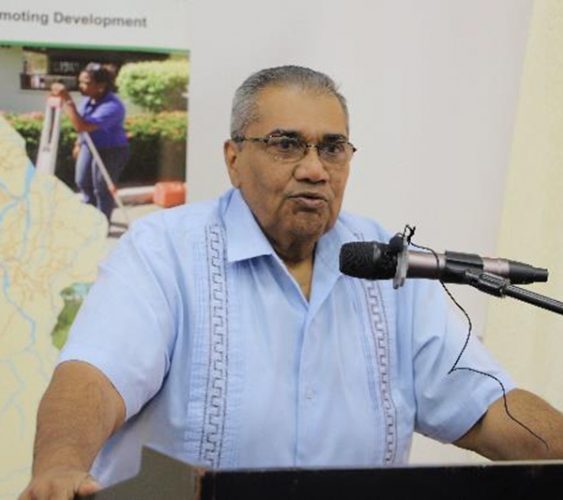As he underscored that government will keep implementing policies across the board for small businesses’ growth, Minister with responsibility for Finance Dr Ashni Singh says that the bid security for contracts under $7 million has been removed and he lauded the increased participation of small contractors in the public bidding process.
He explained that as government works to ensure that at least 20% of state contracts go to small contractors, the National Procurement and Tender Administration Board (NPTAB) implemented a system where those bidding will now sign a self-declaration form guaranteeing their commitment for contracts $7 million and under, instead of the previously required bid security.

“We feel that the small businesses of today are the medium and large businesses of tomorrow and as they are helped, we would see more and more small entrepreneurs entering the economic space here. Government has taken a number of steps to make it easier for small businesses to participate in the bidding process. NPTAB, for example, has taken a number of steps to simply encourage more and more participation in the public procurement process,” Dr. Singh told the Sunday Stabroek in an interview.
“We actively believe in promoting small businesses, and that is across board with assistance, as you will see, from the Small Business Bureau…and other agencies as I have listed, such as NPTAB et cetera, all playing their part to encourage small entrepreneurs,” he added.
Dr Singh pointed to works done under current Chairman of NPTAB Tarachand Balgobin, such as small businesses being given a 5% advantage in bidding and the removal of the bid security.
Balgobin noted that in order to acquire bid security, a contractor would have to go to the bank or to an insurer to secure a guarantee. “For the bank to give you that bid security, you would have to have collateral; some assets. If you don’t have that asset base, but you have the skill, the competency, the experience, the papers and all of that, you still wouldn’t qualify. You would not have qualified. But we have taken that off,” he explained to this newspaper.
He continued, So now you have what is called a Bid Securing Declaration. You don’t have to find any money. All you have to do is to sign a declaration that is incorporated in the bid, which says that if you don’t comply—as in the same way you would have had a bid security—you are voluntarily saying to the government ‘Throw me out’”.
The NPTAB Chairman said that in the same way that a defaulting contractor would lose the bid security, with the declaration process they would accept liability to be penalised by government, which could extend to their ability to be considered for future contracts.
‘Margin of preference’
In March of this year, Balgobin had explained that to allow small businesses access to 20% of government procurement, the NPTAB had implemented a 5% margin of preference to those businesses that qualify under law.
“What we have done is included in the bidding document that there be a 5% margin of preference advantage to small businesses. So if big businesses bid bigger, because of the economies of scale the small businesses can now compete,” he had said.
“When you award, you are awarding to the lowest responsive bidder. If this other person is not registered and his (bid) is 5% above yours, as a small business, you are deemed to be above him. The law allows for a margin of preference, up to 10%, for small businesses and we have started at 5%,” he explained.
Guyana’s Small Business Act provides for 20 per cent of the procurement of goods and services to be set aside for small contractors. Given that this did not include ‘works,’ then Public Procurement Commission Chairperson Carol Corbin had pointed out that small contractors would have had to still compete with big contractors for all construction projects.
She had urged that the laws be amended to include works.
While there had been promises to small businesses since late 2015 that they would be able to be allocated at least 20% of government’s procurement of goods, services and works, the Small Business (Amendment) Act 2020 was only passed in the National Assembly in February of this year.
‘Progressing’
Balgobin made clear that NPTAB believes that small businesses want an opportunity to show that they can participate and are good at the jobs they do.
It is why he said that the agency remains committed to ensuring that more and more persons can qualify to bid for contracts that they themselves as taxpayers pay for.
“The issue is how do you help small businesses to be able to qualify to enter the market and that is part of the standard bidding document. Not to boast, but the modification of the bidding document to allow for the amounts of bids we are receiving has never happened in the history of this country. It [the document] says ‘you don’t have to have all this money for bid security, you don’t have to find resources like that’. Because of that, a number of small businesses have been able to enter the market and we keep progressing,” he said.
Using data and information from NPTAB’s new website (www.npta.gov.gy) and the number of small contractors listed that have been awarded contracts for this year, Balgobin said it was “evidence” that the initiative was working.
“When you look at this [the website] you will see the number of people winning contracts now for the first time and the pool is getting bigger. That is the whole objective—widen the bidding pool so that more people are benefitting from providing services to government,” he said.
“As more people understand, the suspicion and the fears that they had in the past—that they are small and they can’t compete with the big contractors and that only those were getting—that will ease, until it comes to a point where they start to understand that ‘Hey there is a market and opportunity here for me’”, he added.





